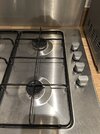Hello,
I have a kitchen that doesn’t have the stop valve anywhere nearby, quite shocking.
In case of a fire, I should try to extinguish the fire and then take the key, go outside and close the gas there.
This is the scenario where the little buttons on top of the kitchens don’t work.
Normally the fire doesn’t develop inside the pipe, so I should be safe, but you should also know that my pipe runs inside the garage, then on top of the plasterboard till the kitchen, this is also quite shocking.
(along the way there is also the boiler)
I tried to open every available lid, but unless it’s behind the back panel, I didn’t see it.
I don’t think this is under regulations, anyway, one thing at a time, I want to replace this damn gas powered kitchen with an electric one, but I already have 2 ovens and I don’t need other two (it usually includes 2 ovens).
So, as a matter of simplicity, is it not better to buy a portable one?
Though the issue with the gas remains, I should still remove it at some point, and if so, then I can simply install a fixed electrical unit.
I have a kitchen that doesn’t have the stop valve anywhere nearby, quite shocking.
In case of a fire, I should try to extinguish the fire and then take the key, go outside and close the gas there.
This is the scenario where the little buttons on top of the kitchens don’t work.
Normally the fire doesn’t develop inside the pipe, so I should be safe, but you should also know that my pipe runs inside the garage, then on top of the plasterboard till the kitchen, this is also quite shocking.
(along the way there is also the boiler)
I tried to open every available lid, but unless it’s behind the back panel, I didn’t see it.
I don’t think this is under regulations, anyway, one thing at a time, I want to replace this damn gas powered kitchen with an electric one, but I already have 2 ovens and I don’t need other two (it usually includes 2 ovens).
So, as a matter of simplicity, is it not better to buy a portable one?
Though the issue with the gas remains, I should still remove it at some point, and if so, then I can simply install a fixed electrical unit.


